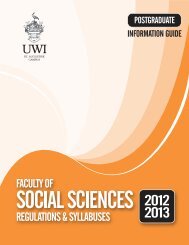Faculty of Humanities and Education (Postgraduate) - The University ...
Faculty of Humanities and Education (Postgraduate) - The University ...
Faculty of Humanities and Education (Postgraduate) - The University ...
Create successful ePaper yourself
Turn your PDF publications into a flip-book with our unique Google optimized e-Paper software.
60<br />
POSTGRADUATE REGULATIONS & SYLLABUSES 2012 - 2013<br />
THE FACULTY OF HUMANITIES & EDUCATION<br />
Content: Issues <strong>and</strong> Concepts<br />
A. Issue #1: Why become a teacher?<br />
• Aims <strong>of</strong> education; ethics <strong>and</strong> teaching<br />
• Self-concept; traits <strong>and</strong> dispositions; pr<strong>of</strong>essional<br />
identity<br />
• Teaching as a vocation; metaphors <strong>and</strong> images <strong>of</strong><br />
teachers<br />
• Discursive construction <strong>of</strong> teachers <strong>and</strong> teaching<br />
B. Issue #2: What are schools for?<br />
• Conceptions <strong>of</strong> the “ideal” person; multiculturalism,<br />
democracy, <strong>and</strong> citizenship; the “good school”<br />
• Development needs <strong>of</strong> adolescents; achievement;<br />
under-achievement; gender <strong>and</strong> achievement;<br />
motivation; indiscipline; interventions<br />
• Role in promoting national, economic, human<br />
development; socialisation; social integration in<br />
a multicultural society; the school’s sorting <strong>and</strong><br />
allocation function<br />
• Language as a tool for the construction <strong>of</strong> knowledge;<br />
the language <strong>of</strong> secondary education.<br />
C. Issue #3: What are the best ways to teach children?<br />
• Teaching vs. indoctrination; student-centred<br />
philosophies <strong>of</strong> education vs. traditional models<br />
• Social <strong>and</strong> emotional learning; empowerment;<br />
teaching <strong>and</strong> learning styles; motivation <strong>and</strong> learning;<br />
differentiated instruction<br />
• <strong>The</strong> school as an organization: Primary <strong>and</strong> secondary<br />
relationships; school violence <strong>and</strong> disengagement;<br />
role <strong>of</strong> the hidden curriculum<br />
• Teacher approaches to Creole <strong>and</strong> interlanguage;<br />
Initiate Respond Feedback (IRF) models; Managing<br />
face issues [linguistic politeness theory]<br />
D. Issue #4 Are schools fair to children?<br />
• Equality; equity; social justice; assessment;<br />
achievement; ability<br />
• Self-esteem; inclusion – needs <strong>of</strong> students; multiple<br />
intelligences<br />
• Organizational <strong>and</strong> classroom practices <strong>and</strong><br />
relationships; achievement related to SES, gender, <strong>and</strong><br />
ability; inclusive practices<br />
• <strong>The</strong> Caribbean child’s constructed language identity;<br />
language socialization; social class <strong>and</strong> literacy;<br />
language as hegemony<br />
Goals/Aims<br />
Participants will develop a broad underst<strong>and</strong>ing <strong>of</strong> the varieties<br />
<strong>of</strong> contexts <strong>and</strong> problematic issues in education <strong>and</strong> schooling<br />
by applying relevant concepts from the foundation disciplines<br />
in education to their experiences <strong>of</strong> schools <strong>and</strong> the educational<br />
environment.<br />
General Objectives<br />
• To provide participants with conceptual tools derived from<br />
the foundation disciplines to assist them in underst<strong>and</strong>ing<br />
educational contexts.<br />
• To provide participants with opportunities to actively use<br />
their knowledge <strong>of</strong> fundamental concepts in education to<br />
integrate theory <strong>and</strong> practice.<br />
Course Assessment<br />
• 100% coursework<br />
• <strong>The</strong> assignments <strong>of</strong>fer students the opportunity to examine<br />
how theories <strong>and</strong> concepts from the foundation areas in<br />
education can be used as a platform to construct a better<br />
underst<strong>and</strong>ing <strong>of</strong> their own development as teachers, as<br />
well as <strong>of</strong> issues in education.<br />
• <strong>The</strong>method<strong>of</strong>assessmentisthroughwrittenreports,which<br />
blend practical experience (discussions, observations,<br />
interviews during the practicum periods) with theoretical<br />
knowledge (gleaned through tutorials <strong>and</strong> lectures).<br />
• Sessions will be scheduled in which tutors will help<br />
students to prepare for the assignments, <strong>and</strong> will give them<br />
feedback.<br />
• <strong>The</strong> first two assignments are submitted <strong>and</strong> marked <strong>and</strong><br />
feedback given to students before the third assignment is<br />
due.<br />
Resources<br />
Required readings<br />
American Association <strong>of</strong> <strong>University</strong> Women. (1992). How schools<br />
shortchange girls. Washington, DC: Author.<br />
Armstrong, T. (1994). Multiple intelligences in the classroom.<br />
Alex<strong>and</strong>ria, VA: Association for Supervision <strong>and</strong> Curriculum<br />
Development.<br />
Barrow, C., & Reddock, R. (Eds.). (2001). Caribbean sociology:<br />
Introductory readings. Kingston, Jamaica: Ian R<strong>and</strong>le.<br />
Bennett DeMarrais, K., & LeCompte, M. (1999). <strong>The</strong> way schools<br />
work. New York, NY: Longman.<br />
Craig, D. (1999). Teaching language <strong>and</strong> literacy: Policies <strong>and</strong><br />
procedures for vernacular situations. Georgetown, Guyana:<br />
<strong>Education</strong> <strong>and</strong> Development Services.<br />
Cunningham, F., LaLonde, D., Neelin, D., & Peglar, K. (2003).<br />
Philosophy: <strong>The</strong> big questions. Toronto, Canada: Canadian<br />
Scholars’Press Inc.<br />
Delpit, L., & Dowdy, J. K (Eds.). (2002). <strong>The</strong> skin that we speak.<br />
Thoughts on language <strong>and</strong> culture in the classroom. New<br />
York, NY: New Press.<br />
Eggen, P., & Kauchak, D. (2009). <strong>Education</strong>al psychology: Windows<br />
on classrooms (8 th ed.). Upper Saddle River, NJ: Prentice Hall.<br />
Gee, J. P. (2008). Social linguistics <strong>and</strong> literacies. Ideology in<br />
discourses (3 rd ed.). New York, NY: Routledge. [Chapter 9]<br />
Goddard, A., & Patterson, L. M. (2000). Language <strong>and</strong> gender.<br />
London, UK: Routledge.<br />
Mulkey, L. (1995). Seeing <strong>and</strong> unseeing social structure. Needham<br />
Heights, MA: Allyn &Bacon.<br />
Muspratt, S., Luke, A., & Freebody, P. (Eds.). (1997). Constructing<br />
critical literacies: Teaching <strong>and</strong> learning textual practice.<br />
Creskill, NJ: Hampton Press.<br />
Mustapha, N., & Brunton, R. (Eds.). (2002). Issues in education in<br />
Trinidad <strong>and</strong> Tobago. St. Augustine, Trinidad: School <strong>of</strong><br />
Continuing Studies, UWI.

















